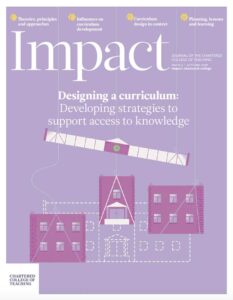A template to trigger and capture improved thinking on curriculum and assessment

The Rise – the first school to be opened by Ambitious about Autism Schools Trust, a multi-academy trustAbbreviated to MAT, a group of schools working in collaboration, governed by a single set of members and directors for students with an EHCP (education, health and care plan) for autism – is not alone in its quest to improve the coherence of our curriculum. However, as an all-through school, with a slightly shorter school day than our mainstream peers, we need to be even more focused on which aspects of the National Curriculum to prioritise. As Martin Robinson (@trivium21c) recently tweeted, ‘Curriculum has to be ‘joined-up’ with each teacher knowing how what they are teaching fits into the overall narrative. They pass the baton on from teacher to teacher.’ It is exactly this coherence that we are wrestling to achieve: a clear 11-year path from Key Stage 1 to Key Stage 4.
Once the 11-year path has been mapped out, the second vital step is to zoom in and specify the key content for each unit. Both Willingham (Willingham, 2009) and Christodoulou (Christodoulou, 2016) have debunked the notion that a generic ‘skill’ such as problem-solving exists in isolation; instead, ‘Experts in every field depend on rich and detailed structures of knowledge stored in their long-term memory.’ (Christodoulou, 2016, p. 34) I wanted to create a template that would prompt colleagues to identify the knowledge our students need in order to continually progress with their learning.
I am indebted to the work of Andrew Percival (Percival, 2018), whose template provided the foundation for ours in Figure 1. Completed examples or a range of subjects can be found at: http://bit.ly/2yUTR35
The rationale for each section of the template is as follows:
1. As a SEND school, referencing the National Curriculum allows us to self-check for rigour.
2. We know from cognitive scienceThe study of the human mind, such as the processes of thought, memory, attention and perception that: ‘Without the prior knowledge, the new learning can’t be understood; it can only be vaguely ‘remembered’… So checking and repairing prior knowledge is the first stage of learning.’ (EBTN, 2017)
3a. Mccrea (McCrea, 2017) argues that ‘students will forget what they have learned unless we take deliberate steps to help them remember’ (p. 80). Without specifying the key content at the outset, it becomes impossible to orchestrate opportunities for recall. This ‘box’ will deliberately focus on detailing specific content such as this statement from a Year 3 music unit: ‘A set rhythmic accompaniment is called a tal and is usually played by tabla drums’ – rather than a pedagogical focus on how this knowledge will be taught and acquired.
3b. Quigley (Quigley, 2018) provides the moral imperative to strengthen vocabulary instruction: ‘the limits of their vocabulary really do prove the limits of their world’ (p. 6). Every subject must contribute to developing students’ ‘word-hoard’. Additionally, CPD for teachers of all subjects on how to consolidate understanding of newly acquired tier two vocabulary will be provided, based on the menu of instructional activities described in Beck et al.’s Bringing Words to Life (Beck et al., 2013).
4. Learning should be a joyful experience. This is reinforced by Foer’s (Foer, 2012) TED Talk, which reiterated ‘we remember when we pay attention… We remember when we are able to take a piece of information and experience, and figure out why it is meaningful to us’.
5. Sherrington (Sherrington, 2017) suggests that ‘reading diets in schools are generally too low and… confined to too few subjects’ (p. 185), which certainly resonated with us. Reading will also build background knowledge, which is important for learning (Willingham, 2009, p. 37).
6. Our students (all with autism) benefit from the identification of particular social skills that can be developed during a unit.
7. Based on Christodoulou (2016), we are divorcing formative and summative assessments. Very briefly, our assessment system will incorporate frequent formative assessments that are low-stake – with different formats serving different subjects. We will have termly summative assessments that are cumulative.
These templates are intended to make retrieval practice more straightforward, and to be useful for teaching assistants and families. They are, of course, a work in progress that will be subject to further review and refinement.











